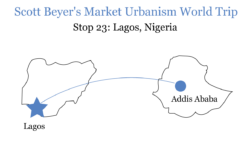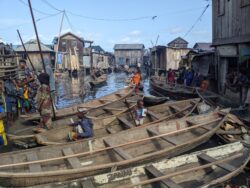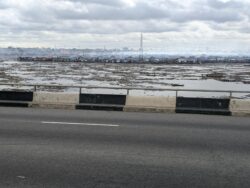Makoko: The City on Stilts
The Nigerian fishing village is a place of danger but also entrepreneurial spirit and governing autonomy.
Phone beeps. Cesare, my Lagos chaperone, is reaching his contact, Adeola, as we approach Makoko.
“You did not tell me you are coming with a white man so I must make proper arrangements!” she blares over speakerphone. “The gangs here see this town as a tourist center. They will demand tips from him to access the slum.”
This comment from Adeola Deborah Adepoju, an educator in Makoko, came upon hearing my voice. We finally meet in person at the slum’s entrance, she enters the car, and down we drive to this fascinating city on stilts, dubbed the “world’s largest floating slum.”

Makoko is a massive informal fishing village that exists along the banks (and into the water) of Lagos, Nigeria, visible from the city’s massive Third Mainland Bridge. It has grown organically since the 19th century when fishermen from neighboring Togo and Benin settled there, and later when Egun tribesmen built infrastructure. It consists of informal settlements built on land, but famously, also on stilts atop the water. Present population is uncertain: the slum is excluded from national censuses, although estimates go up to 250,000.
Lacking a formal government, Makoko is run by tribal chiefs, one of whom we meet there, 24-year-old Wheduto Urban. He takes us through a maze of narrow alleyways and out to the shoreline, where a canoe waits for us.

Much of my previous time spent in Lagos, stop 23 on my 1.5-year Global South tour, was spent visiting the metro’s “startup cities” – private sector attempts to build new communities. But Makoko may be the ultimate startup city. Floating through with Urban and the rest of my group, we pass by restaurants, schools, churches, shops and more, all sitting a dozen or so feet above-water, a full-service neighborhood on stilts.
While nominally part of Lagos state, Makoko is a self-governing community. Eleven chiefs (locally called baales) oversee land and water rights; water ownership is based on inheritance. The baales can reallocate rights, and are also responsible for settling disputes and maintaining law and order. They also handle land use, policing, schooling and more. There is almost no relationship with any surrounding government, explains Urban, save the rare occurrence of serious crime, which is handled by Lagos’ police and courts.
Makoko’s major commercial activity is fishing. The canoe network, while also serving as taxis, is taken deeper into the lagoon by fishermen. First viewing from the bridge, I had seen a fog over Makoko, which turned out to be coming from kitchens, where fish are smoked. I bought a sizable one for 50 cents, but could have negotiated a lower price with the trader. Women are usually seen hawking these smoked fish throughout Lagos from baskets woven out of wooden splints.

Makoko’s major import is wood, which gets shipped down the lagoon from Ogun state. Imported tax-free, it’s used to build canoes, homes, stores, schools, and recreation centers on stilts above water. It’s also used for firewood for cooking and smoking fish. One school being built with the wood, which will be managed by Urban, will cost $11,000 to complete.
With Lagos’s private bus system, vehicles are often stopped by transport union workers who collect levies that seem to be unaccounted for. Makoko’s transport system differs in that they created their navigable waterways, and boats bring riders directly to their preferred location (similar to UberBOAT’s operations in Lagos) without any surprise levies.
Canoeing around Makoko, I saw kids having fun and swimming in the dirty water. That’s where they trash their waste until it washes out. On land, there are dedicated disposal sites where waste is left to decay, a common problem in other African slums.
Education in Makoko is free and run by youth and young adults in the community, through a non-governmental organization that Adepoju works for. Its funding comes from associations, groups, institutions, and private donors.
Makoko’s main participation with surrounding governments is trying to convince them not to destroy it. In 2012, the Governor of Lagos state ordered that stilts at the waterfront close to the power line should be demolished. More recently, the Lagos state government announced plans to dredge and demolish the informal settlement. It’s notable that Makoko indwellers virulently oppose this, preferring to live in a situation others would find unbearable.
Makoko is far from an ideal situation. Kids run around naked, swim in dirty water, and breathe polluted air. Adults have dangerous livelihoods, such as managing logs in the water or diving beneath it to dredge up sand. Nobody there enjoys anywhere close to the amenities that we First Worlders take for granted. It’s telling that I, as a white visitor, needed tribal oversight to avoid gang harassment; it speaks to what are likely larger public safety problems faced by everyday residents.
But Makoko still testifies to the self-governance people create when nothing from the outside has been provided to them. It is brimming with activity, entrepreneurship and voluntary exchange. As Charles Kenney wrote for Foreign Policy, “slums don’t make people poor, they attract poor people who want to be rich.” I saw shades of that all throughout Makoko.
All images credited to Scott Beyer and The Market Urbanist.
Catalyst articles by Scott Beyer | Full Biography and Publications
